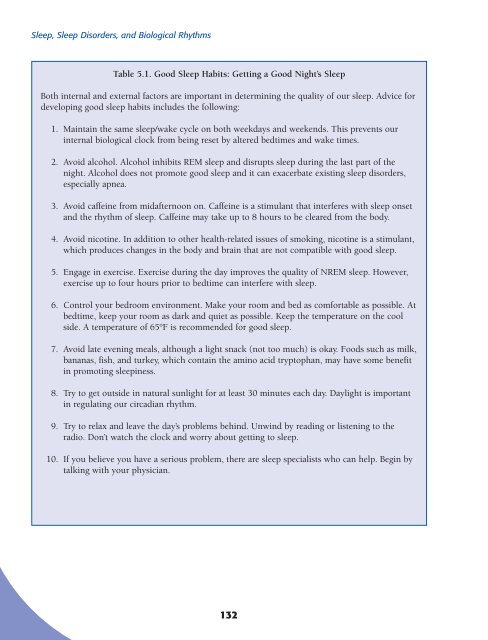Biological - NIH Office of Science Education - National Institutes of ...
Biological - NIH Office of Science Education - National Institutes of ...
Biological - NIH Office of Science Education - National Institutes of ...
Create successful ePaper yourself
Turn your PDF publications into a flip-book with our unique Google optimized e-Paper software.
Sleep, Sleep Disorders, and <strong>Biological</strong> Rhythms<br />
Table 5.1. Good Sleep Habits: Getting a Good Night’s Sleep<br />
Both internal and external factors are important in determining the quality <strong>of</strong> our sleep. Advice for<br />
developing good sleep habits includes the following:<br />
1. Maintain the same sleep/wake cycle on both weekdays and weekends. This prevents our<br />
internal biological clock from being reset by altered bedtimes and wake times.<br />
2. Avoid alcohol. Alcohol inhibits REM sleep and disrupts sleep during the last part <strong>of</strong> the<br />
night. Alcohol does not promote good sleep and it can exacerbate existing sleep disorders,<br />
especially apnea.<br />
3. Avoid caffeine from midafternoon on. Caffeine is a stimulant that interferes with sleep onset<br />
and the rhythm <strong>of</strong> sleep. Caffeine may take up to 8 hours to be cleared from the body.<br />
4. Avoid nicotine. In addition to other health-related issues <strong>of</strong> smoking, nicotine is a stimulant,<br />
which produces changes in the body and brain that are not compatible with good sleep.<br />
5. Engage in exercise. Exercise during the day improves the quality <strong>of</strong> NREM sleep. However,<br />
exercise up to four hours prior to bedtime can interfere with sleep.<br />
6. Control your bedroom environment. Make your room and bed as comfortable as possible. At<br />
bedtime, keep your room as dark and quiet as possible. Keep the temperature on the cool<br />
side. A temperature <strong>of</strong> 65°F is recommended for good sleep.<br />
7. Avoid late evening meals, although a light snack (not too much) is okay. Foods such as milk,<br />
bananas, fish, and turkey, which contain the amino acid tryptophan, may have some benefit<br />
in promoting sleepiness.<br />
8. Try to get outside in natural sunlight for at least 30 minutes each day. Daylight is important<br />
in regulating our circadian rhythm.<br />
9. Try to relax and leave the day’s problems behind. Unwind by reading or listening to the<br />
radio. Don’t watch the clock and worry about getting to sleep.<br />
10. If you believe you have a serious problem, there are sleep specialists who can help. Begin by<br />
talking with your physician.<br />
132

















